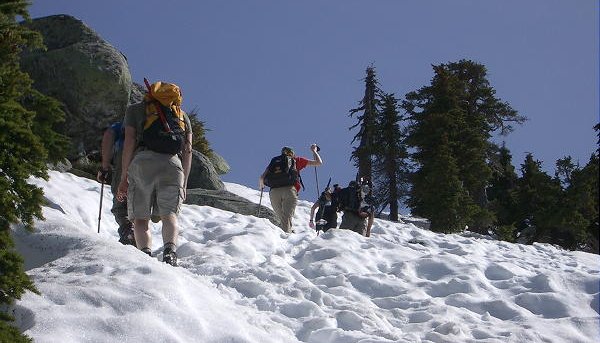Janna's Blog
Hands-on practical tips, advice, and perspectives are found in Janna's blog. Contact us for topics and questions you would like addressed in the blog.
<< <
Page 4 of 27
> >>

"No one listens to my ideas! I can share an idea with my team and it gets dismissed. Then a few months later someone else on the team shares essentially the same idea and everyone sees the merit and we implement that idea. It is so frustrating to not be listened to!"
Such is the lament I have heard from countless executives, CEOs, and team members at organizations of all sizes and shapes. I'm consistently asked how to fix this "issue", in part so that a good idea can be implemented that much sooner.
Yes, it is true that many good ideas are ignored based on factors such as how the idea is delivered, timing, and--of course--the person making the delivery. While all of these factors can be improved upon, many times the core issue is a concept of the farmer and the seeds.
As a teenager I spent a summer on a Nebraska farm. One of the many discoveries I made is that farming takes patience and perseverance. In the spring, the seed is planted after the ground is prepared. It is then watered - usually by rain and also by irrigation in some parts of the country - and then you wait for the harvest, which usually isn't ready until the mid to late summer.
If you think all of your business ideas are being ignored, here's another way to interpret it. Think of those ideas as seeds that need time to be watered, to germinate, and then break through the hard crusted soil of your team's ears and listening skills. You are the farmer that needs to till the soil as well as provide the water, sunlight, and time needed to actually produce a plant worth harvesting.
So often ideas are ahead of their time, or team members aren't good at taking something new and running with it. Sometimes the idea percolates in the brains of the team, often without them really understanding that they are processing that exact idea that you planted. It then shows up as their idea, and they don't even remember that you planted that seed months ago. Now I do agree that there are people who steal ideas for their own. That is unfortunate but also ultimately career-ending when the thief is discovered.
Your challenge is both to understand farming within your organization and to accept the incredible value you provide by being the farmer who plants the seed. Ideas need time to germinate. Some ideas often come before their time. One idea can be a foundation for a better idea. I have often joked that I was the queen of bad ideas. Yet any bad idea (among my many good ones) generally created the discussion and thought process needed to develop a better, more successful idea.
So for those who are the farmers in your business and planting seeds within the organization, appreciate the value you provide and stop whining that no one listens to you. They do; it just often takes time for those seeds to become fruitful--and for people to thank the farmer.
By Janna Hoiberg--From my upcoming book:"The Backpacker's Guide To Business Success"
"It isn't what you have or who you are or where you are or what you are doing that makes you happy or unhappy. It is what you think about it." - Dale Carnegie

We live in Colorado and hike at high elevations, where we have little oxygen compared with our previous sea-level home. Physical activity that might be fairly easy at lower elevations becomes, you might say, more "breath-taking" up here. When I first moved to Colorado I went for a walk at 8,500 feet. I kept thinking to myself, "I am in worse shape than I thought. I am so short of breath it's ridiculous." Then the light dawned: the problem wasn't me. It was the elevation. I needed time to adjust to high-altitude breathing.
At high altitudes, physical activity--like running up a mountain--is more difficult. If you are going from low elevation to high elevation for an athletic event, you need to allow yourself time to acclimate. If you are going very high--say you are going to climb a "fourteener"--you might even want to stop in the middle somewhere (perhaps Denver or Colorado Springs) and wait a day or two before you go higher. If you cannot allow time to acclimate completely, your pace must be adjusted. Another option is to work out so hard and get in such good shape at your low altitude hometown that your body can manage the change in elevation. For people who are particularly sensitive, all of these techniques taken together might be a good idea. Some people are not bothered at all; others can have significant effects due to altitude sickness.
The effect of altitude on athletic performance is one of the reasons that the United States Olympic Center (USOC) is located in Colorado Springs. Because there is relatively little oxygen at high altitudes, people who live there produce more red blood cells than people at lower altitudes. When athletes train at high altitudes then travel to lower altitudes for competitions, they are better conditioned than people from lower elevations. They have more endurance because their bodies receive more oxygen via more red blood cells. Compared to athletes who train at lower elevations, they are more prepared. This better conditioning lasts for ten to twenty days.
Our attitude affects our professional lives in the same way elevation (or altitude)
affects physical activity.
Even a simple activity at work can be quite difficult or stressful if approached with a negative attitude, and difficult situations (which come with stress built in) require outstanding positive attitudes to be met effectively. We need to prepare for work challenges and adapt our attitudes in much the same way that our bodies adjust to the challenge of high altitudes.
Backpackers prepare for physical challenges in much the same way professionals prepare for business and career challenges--in advance of the situation and consistently. When preparing for a backpacking trip, we know that anyone coming with us must be physically prepared to handle the rigors of the trail. Someone's first backpacking trip should not be a five-day journey with a 13,000-foot elevation gain. We start with a short weekend trip--to shake out what they know and what they can handle. This type of shake-out trip was always fun with Boy Scouts. There was almost always one scout who, with a target of feeding three people, would bring a cooler of food and a lot of cans (which are heavy)--enough food to feed the entire troop for a week! (Every person who has backpacked and is honest will admit to bringing things along in the early trips that they now scoff at as being unnecessary and showing inexperience.) They would trudge along, weighed down, and start complaining about 200 feet onto the trail. As leaders we would caution scouts, parents, and anyone who would listen not to over pack. But it never failed; at least one scout brought along everything including the kitchen sink. Such mishaps are what stories are made of and how people learn, but such a situation would be disastrous on a five-day trip. We take a short trip the first time so the lesson can be learned.
Preparation is not just about packing, of course; it also involves physical conditioning. Experienced backpackers know that going all winter without doing any physical workout, exercise, or activity and then just heading out on a trail results in sore legs, groaning, and general unpleasantness. So we work out all winter. That StairMaster is not my friend, but to my body it resembles the steps on a mountain. Those core-building classes at the gym are good for my health, although I usually question their value about forty minutes into the class.
The concept of choosing a goal and sticking with it is important. Then, after setting a goal, you must plan, prepare, and lay the appropriate foundation to achieve success. You also must understand the potential risks associated with your plan. If a mountaineer is going to invest in climbing a mountain but doesn't want to end up being the one who gets rescued because of lack of preparation, he or she must plan, develop the necessary skills, and perform critical thinking tasks in order to address the risks. The same is true in business and careers.
If you are going to invest all your savings on a single business venture, you'd better
understand the risks.

Have you ever had a perspective that you wouldn't release? Did it turn into a fear that became unfounded? Recently I realized that my own "view of things" blinded me to joy and potential, and left me in a state of fear.
My husband and I have owned a lake house in New Hampshire for over 25 years. There are many stories, memories, and experiences from that lake house, and it has always been our dream to spend summers there when we stop working full time. (Notice I didn't say retire.) In preparation for that time we will be remodeling the cabin over the next few years. The first step is building a garage so we can take a vehicle to New Hampshire and leave it there. Watch out Hertz, your profits will tumble when we stop renting cars!
Part of this process has required taking down some trees so we can fit this garage, and it was stressing me out. When a tree is cut there is no going back. Was this the right thing to do? Were there other options? Would I like it once the trees were cut? Was the garage in the right place? (There wasn't any other choice, but that didn't change my fear.) What would the neighbors think? My mind kept going through all the bad stuff, all the fears, all the negatives.
The day they started cutting, I was 2000 miles away in Colorado and not able to see what was happening or what it looked like. My fear remained with me.
Two days after the trees were cut I needed our local handyman to stop by and check on something for me. In talking with Horace, he commented on how GREAT the place looked with the trees down. What? The place looked GREAT with the trees down? What a perspective. What a new concept. It had never crossed my mind that the place would look even BETTER without the trees. I was almost in tears as he shared this freeing perspective. It was as if 1000 pounds was released from my shoulders.
How often are we carrying more than we need in our business environments and our personal lives? I was given a gift by Horace that day: a gift of removing my blinders and looking at things from a new perspective. Where are your blinders? Is someone offering you another perspective on your customers, your business environment, your fears? Are you listening?
Taking off my blinders allowed me to start having fun with the garage project. I have since seen the result, and Horace was right. It does look good. How much nervous energy did I needlessly expend in wondering (and yes, I'll admit it, worrying) and driving those around me crazy?
Where are your blinders? What do you need to do to remove them and allow yourself a fresh perspective?
This is an excerpt from my upcoming book, "The Backpacker's Guide to Business Success."
 “If you don’t know where you are going, every road will get you nowhere.” – Henry Kissinger
“If you don’t know where you are going, every road will get you nowhere.” – Henry Kissinger
My first backpacking trip was fun—especially when the pack was off! Only after multiple trips did I learn how the backpack could almost be part of me, to the point that I didn’t feel the weight or even think about this 35- or 40-pound thing on my back. We moved together. We were attached, and that was good. This change happened because I learned that the planning and preparation part of the trip was as important as the actual physical part of backpacking. Planning was required--my attitude needed to be in balance, the people that came along were critical, and having the right gear made a tremendous difference.
All the work that takes place before you actually step foot on the mountain determines how much fun you will have on the mountain. And the same is true in business: the quality of your planning determines whether or not you will succeed. Yet, statistics reveal that people spend more time planning for vacations than they do for their business or careers.
In the wilderness, lack of preparation and planning creates forest fires, millions of dollars spent on rescues, and loss of life. The same lack of preparation and planning in business creates failed projects, debt, and loss of productivity.
Plans can be changed and often should be changed. New opportunities, new ventures, road blocks, or changing interests will alter our plans. Yet the possibility of change is no reason not to have a plan. By the time I graduated from Suffolk University in Boston, with a degree in sociology and an emphasis in crime and delinquency, I had determined my true passion was in business. I look back on my career and wonder what I would be like if I had gone ahead and worked with delinquents, just because that was my “plan.”
From the outside, it certainly looks like my plan changed. But my fundamental goal—the foundation of my “plan”—has never changed. I always wanted to help people, impact lives, make a difference. I am just doing it in a very different way than I envisioned. The reality is my plan hasn’t changed. The execution of the plan and the path I took changed, but not the fundamental purpose. The same is true on the mountain. No matter how much I know about the path I'm walking, the journey is always a surprise beyond my imagination.
It is ok to change the plan, but there is a profound difference between intentional course correction and unintentional wandering. You know you are wandering if you wonder where you are going and when you will arrive—especially if you wouldn’t recognize arrival if it stood in front of you!
That is why life is often called a journey. I use the word journey intentionally. There will always be a mountain to climb and the opportunity to grow as long as I draw breath. About some of the journeys, I will have clarity; others, not so much. Some journeys will be more difficult, some easier. But the attitude in which we approach each of the different journeys can make the difference between the outcome of “I did it!” and the outcome of “Is that all there is?”
 Colorado Springs is a wonderful place to live. We have beauty all around us, weather that is fantastic, and residents who would never want to live elsewhere. As business owners, what more could we ask for as a foundation of the local economy?
Colorado Springs is a wonderful place to live. We have beauty all around us, weather that is fantastic, and residents who would never want to live elsewhere. As business owners, what more could we ask for as a foundation of the local economy?
While we love Colorado Springs, we have all felt the impact (literally) of potholes on our streets. Having lived in the pothole capital of the US--Boston--for many years, I never thought I would say Boston roads are in better shape than those in Colorado Springs. Yet they are.
As a community we have not taken care of our infrastructure (roads, storm water, etc.). There are many excuses. Yes, I did say excuses. The beauty of the local area is compromised by the effects of not caring for its physical foundation.
This concept also is true of business owners. We want to live here, start businesses here, and retire here. Yet what have we learned from the lack of attention to the foundational infrastructure in the community that we can apply to our businesses? In other words, what potholes do you have in your business? How will those potholes affect you when business challenges storm against them?
Investment in our business is critical. Investment in our city is critical. Yes, it will cost us money. Yes, I expect the taxes will go up. To be clear, I don’t like to spend money. I am, however, willing to invest money in building a stronger local business environment that reaches outside of our wonderful city. Investing is very different than spending. We must invest. Investing creates wealth; spending creates little.
Is the local business community investing in the creation of solid companies that can build wealth? Or are we building something that will fall apart the minute we as business owners stop propping it up? The terms "wealth," "creating," and "building" are not dirty words. Business owners have a responsibility to build a strong foundation in our companies, investing in the infrastructure of the company so it can withstand the storms of changing competition and economic uncertainty.
Building wealth is not just about more money but also includes the riches of having qualified employees and true leaders in our companies. It is a diverse business environment that makes other businesses want to move to Colorado Springs, not just for our natural beauty, but because the business community has learned how to build true wealth that comes from strong and resilient organizations, people, education, and leadership.
Business owners, what are you truly doing with your time? Yes, you are busy, but are you busy doing the right things for your business? Too many business owners are spending too much time working on things that keep the business afloat. The business owner needs to stop doing the $20 and $30 and $50 per hour jobs and start doing the jobs that few in the company can accomplish. What innovations, new technology, or new ways of looking at old problems can you generate? One idea from the owner can often generate tens of thousands of dollars for the company and the community. Those new ideas do not come when you are working ten-hour days on bookkeeping, purchasing, or customer service.
True wealth comes from leveraging your time to actually make new ideas happen. This doesn't necessarily mean revolutionizing your business the way Cirque Du Soleil did the circus, but key results can come from continually stepping away, learning new concepts, implementing new ideas and strengthening the foundation of the business you have created.
Potholes on our roads come from harsh weather conditions, poor road maintenance, and improper road foundations. Potholes in business come from harsh economic conditions, poor investment in our business infrastructure, and inadequate business foundations.
What are you ready to invest in your business infrastructure to ensure potholes don’t have a lasting effect on your business?
 "No one listens to my ideas! I can share an idea with my team and it gets dismissed. Then a few months later someone else on the team shares essentially the same idea and everyone sees the merit and we implement that idea. It is so frustrating to not be listened to!"
"No one listens to my ideas! I can share an idea with my team and it gets dismissed. Then a few months later someone else on the team shares essentially the same idea and everyone sees the merit and we implement that idea. It is so frustrating to not be listened to!"
 Have you ever had a perspective that you wouldn't release? Did it turn into a fear that became unfounded? Recently I realized that my own "view of things" blinded me to joy and potential, and left me in a state of fear.
Have you ever had a perspective that you wouldn't release? Did it turn into a fear that became unfounded? Recently I realized that my own "view of things" blinded me to joy and potential, and left me in a state of fear. “If you don’t know where you are going, every road will get you nowhere.” – Henry Kissinger
“If you don’t know where you are going, every road will get you nowhere.” – Henry Kissinger Colorado Springs is a wonderful place to live. We have beauty all around us, weather that is fantastic, and residents who would never want to live elsewhere. As business owners, what more could we ask for as a foundation of the local economy?
Colorado Springs is a wonderful place to live. We have beauty all around us, weather that is fantastic, and residents who would never want to live elsewhere. As business owners, what more could we ask for as a foundation of the local economy?